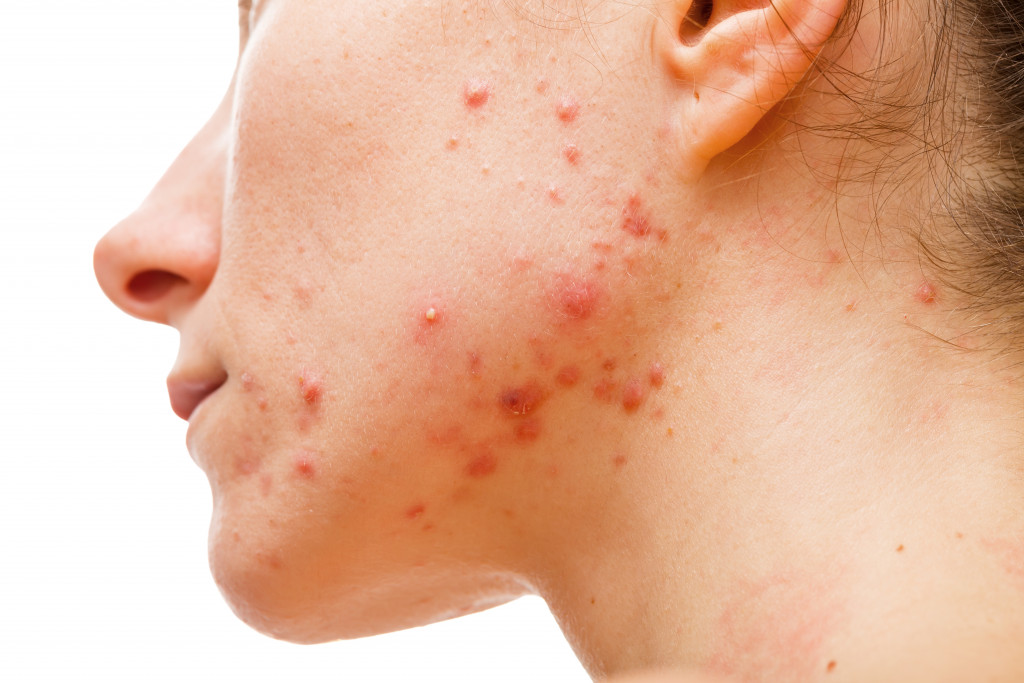• Acne is an inflammatory skin condition caused by a build-up of dead skin cells and excess oil.
• The severity of acne varies between mild, moderate, and severe, depending on the intensity of symptoms.
• Hormonal imbalances and dietary choices are two common causes of acne.
• Stress and poor hygiene can also lead to breakouts.
• Acne scarring often happens when bacteria infect the skin or if a pimple is picked and squeezed.
Acne is a common skin condition that affects people of all ages and backgrounds. It is caused by a combination of factors, including hormones, genetics, and lifestyle choices. Here’s a look into what Acne is, what causes it, and how you can deal with it in the future.
What Is Acne?
At its simplest, acne is an inflammatory skin condition caused by clogged pores due to the build-up of dead skin cells and excess oil. Clogged pores can become inflamed and lead to red bumps or pimples on the skin. Acne can appear on any body part but is most common on the face, chest, back, and shoulders.
Types of Acne
Acne can be divided into three main categories – mild, moderate, and severe – depending on the intensity of symptoms. Mild acne refers to small red bumps on the skin that are not painful or inflamed; moderate acne includes larger bumps that may be more tender; severe acne consists of large painful cysts filled with pus that can affect deeper layers of skin.
What Causes Acne?
Anyone can have acne, but science knows its specific reasons. Here are some things that cause acne:

Hormonal Imbalances
One of the leading causes of acne is hormonal imbalances. During puberty and other stages in life, when hormones fluctuate rapidly, it can cause an increase in oil production which leads to clogged pores and breakouts.
This type of acne is typically found on the face, neck, chest, and back where there are more sebaceous glands (oil-producing glands). To combat this type of acne, it’s best to consult your doctor or dermatologist, who can prescribe medications or treatments targeting the underlying cause – hormone imbalance.
Dietary Choices
Confident dietary choices can also contribute to acne breakouts. Eating foods high in sugar or dairy products can cause your blood sugar levels to spike, leading to inflammation in the body and an increase in oil production on the skin, leading to pimples and blemishes.
To help reduce the chances of experiencing breakouts due to dietary choices, it’s crucial to maintain a balanced diet filled with nutrient-rich foods such as lean proteins, complex carbohydrates, fruits, and vegetables. It’s also beneficial to limit your intake of processed sugars, dairy products, and unhealthy fats like trans fats.

Stress
Stress is another crucial factor contributing to acne breakouts due to its negative impact on our body’s natural functions, such as sleep patterns and hormone production. For example, when people experience chronic stress or anxiety, it causes their bodies to produce more cortisol – a hormone associated with increased oil production on the skin leading to breakouts.
To combat stress-related acne breakouts, it’s essential for everyone to take time out for themselves each day – whether through exercise, meditation, or simply spending time outdoors – so that people can reduce cortisol levels in their bodies naturally without relying on medications or treatments prescribed by a doctor or dermatologist.
Hygiene Habits
Poor hygiene habits are yet another contributor to acne breakouts. Not washing your face regularly enough or using harsh cleansers/soaps can strip away your skin’s natural oils, leaving your skin dry and irritated, increasing oil production, and causing blemishes and pimples on your face/body.
To avoid this type of breakout, people must practice good hygiene habits by washing their faces twice daily (morning & night) with lukewarm water & mild soap/cleanser suitable for their skin type (e.g., oily skin should use a cleaner designed specifically for oily skin). They should also avoid touching/rubbing our faces too often as this will spread bacteria from one area onto another, which will only worsen existing pimples/acne symptoms!
Acne Scarring
Lastly, you must know about acne scarring. This kind of scarring often happens when an infection develops in the skin or if a pimple is picked and squeezed.
Acne scars can range from minor discolorations on the skin to deep depressions. If you find yourself with acne scarring, there are treatments available. One of them is through a cheek enhancement service. This service utilizes filler injections to plump up the skin and restore volume, thus improving the appearance of acne scarring.
It is important to remember that acne does not have to be permanent; there are steps you can take to reduce its impact on your life. Consulting with a professional is the best way to treat your acne and restore your skin’s health. With proper care and maintenance, you can achieve clear skin and renewed confidence in no time!
